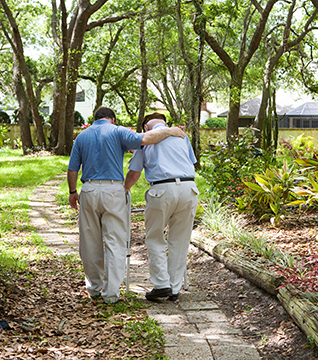Top 5 FAQs about Depression in Seniors

Depression is a serious condition that affects an individual’s mental health and wellbeing as well as their ability to carry out daily activities. According to the National Institute on Aging (NIA), “Depression is more than just feeling sad or blue. It is a common but serious mood disorder that needs treatment. It causes severe symptoms that affect how you feel, think and handle daily activities, such as sleeping, eating and working.”
Although depression is commonly associated with aging, it is NOT a normal part of the aging process. Often, signs of depression in the elderly are ignored or misattributed to significant life changes like the loss of a spouse, increased isolation, undiagnosed or poorly treated health conditions and more.
Below are five answers to some of the most commonly asked questions about depression and the elderly. As always, consult with your doctor or a medical professional for guidance before making any healthcare decisions.
Q: What causes depression in seniors?
A: Seniors are at a higher risk of developing depression due to:
• Not having a close network of social support
• Living alone/social isolation
• Losing a spouse or a loved one
• Developing health conditions or complications
• Increased worries about financial security, chronic illnesses or fears about death or dying
• Genetic factors or a family history of depression
Q: Are depression and dementia related?
A: According to a study published in 2010 in the journal Neurology, there is a correlation between dementia and depression. Although research has proven that there is a connection between both conditions, the relationship between them is complex. Individuals who have depression at any stage of life have a significantly increased risk of developing dementia. However, it is important to note that just because an individual has depression does not mean that they will develop dementia and vice versa.
(Related: How to Detect the Early Signs of Dementia)
Q: Is seasonal depression a real type of depression for seniors?
A: Seasonal depression or Seasonal Affective Disorder (SAD) is a form of depression that can affect individuals of all ages, including seniors. Seniors may be more likely to experience seasonal depression due to limited mobility or not being able to travel, visit family or friends and take part in outdoor activities in the winter months. Although seasonal depression occurs during specific times in the year, both symptoms and treatments for seasonal depression are the same as other forms of depression.
Q: What are the signs of depression in seniors?
A: Signs of depression in the elderly often go undetected due to mistakenly attributing symptoms to other conditions or assuming that forgetfulness, increased isolation or “slowing down” is part of the aging process. However, the symptoms of depression are not a normal part of aging and last for a prolonged period. Be sure to watch for the following signs, especially if they last for more than two weeks:
• Feelings of sadness or hopelessness
• Memory problems
• Low energy
• Agitation/irritability
• Having difficulty sleeping
• Weight loss/gain
• Neglecting personal care
Q: How do you treat depression in seniors?
A: Treatment for depression varies depending on each person’s specific needs. However, several effective treatments for depression include talk therapy, medication and social support. An effective long-term treatment plan might include one or more of the listed forms of care.
If you or a senior loved one are experiencing symptoms of depression, there are resources available to help. Consult with your doctor, family member or friend and know that you can call the toll-free National Suicide Prevention Line at 1-800-273-TALK at any time.
For many seniors, loneliness and a lack of social interaction are reasons for considering a move to a personal care or retirement community. For information about our senior care communities and services at our locations in Western Pennsylvania, Eastern Ohio and Tampa Florida, visit our locations map or call our headquarters any time at 724-352-1571. You can also message us through our online contact form.
Get Updates From Concordia
There is always a LOT happening at Concordia! Would you like to stay up-to-date with our news and events? Sign up for our monthly e-newsletter here.
